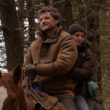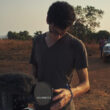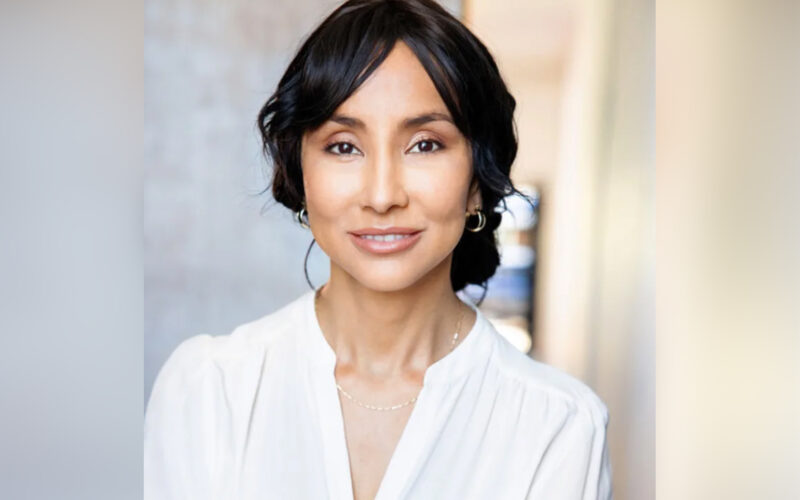Carolina Hoyos is a first generation Peruvian Quechua-Inca Afro-Latina who splits her time between acting/writing/directing for stage and film and releasing records as singer/songwriter/multi-instrumentalist A Girl I Know. She recently premiered he work on the film feature “Lee’d The Way” where she portrays a spirited Native American who joins forces with an unlikely hero.
Hoyos began as a childhood concert pianist before spending 3 seasons on “MTV Hits”. She plays captive songstress Antonella in Nicolas Winding Refn’s highly anticipated Amazon series “Too Old To Die Young”, firecracker Anise Silverlight in Austin Film Festival Winner “Blackwater” and Vice Presidential hopeful Celeste Seedlingsun in the film “Lee’d The Way”. She’s narrated for Harper Collins, made fun cameos in “Under the Silver Lake”, “Gene Simmons: Family Jewels”, Pharrell Williams’s video of the Oscar-Nominated song “Happy” and has shared the stage with a variety of music luminaries. Hoyos sat dow with Indiewire about her new role and the changing landscape in Hollywood
How important is it for you to advocate for Native American rights in Hollywood?
We’ve gained some real momentum and to some, that might seem like enough. But as someone who knows the sociological effect of not having much of any real representation for so long, it’s vital for continued progress to remain consistent and vocal. It pains me to hear how it affected and still affects our older generation and I refuse to stand by and let our younger generation have to repeat that.
Tell us about your character in Lee’d The Way and how she is similar or different to Carolina Hoyos?
Celeste Seedlingsun is an advocate for her community. She’s an organizer and can gather folks and inspire them to effect change. She sees in Patrick Lee someone that people can get behind and helps him practice ways to communicate his ideas.
Celeste and I are very similar in this aspect. I come from a family of powerful female community advocates. I’m from Washington, DC and in the 60s and 70s you would regularly find my Mother, Grandmother and aunt at a protest, a voter registration drive, working directly to help women, immigrants and inner city youth, and even fighting for protections against the nuclear arms race.

My aunt, Susana Cepeda, was also a Human Rights attorney working as a top coalition aide with Jesse Jackson’s National Rainbow Coalition. As part of her work, she also traveled internationally to meet with dignitaries on peace seeking missions. I’m not quite as involved as my aunt or Celeste, but it is my mission to provide a platform and make space for those who need to be heard.
And growing up with this line of women meant I was volunteering and/or performing at fundraisers since I was a young girl for organizations like Latin American Youth Center, Breast Cancer Race For the Cure, Musicians On Call, PATH, LIFEbeat’s Hearts & Voices, Alzheimer’s Association, The Autism Society, Pediatric AIDS Foundation, American Foundation for Suicide Prevention, amongst others.
What impact do you think this role has on Hollywood – How Does She Challenge Conventional Thinking?
Most non-Caucasian actors have been asked to play into stereotypes. To be limited to a lower economic and social class and rarely hold positions of power or be seen as role models. I’ve always had a hard time with how backwards Hollywood has been, being that my family is filled with powerful women who have been doing the thing for generations already.
This role comes at a time when we have four congresswomen known as The Squad and we can see that inspiring to affect real change isn’t limited to one gender or ethnicity. All of this representation can inspire the next generation to speak up and believe they can make a difference.
Who inspired you, and how do you want to inspire others, especially the next generation of women In film & television?
I’d use this space to continue gushing on my family but I’ll highlight some others who’ve inspired me. Nemonte Nenquimo, who filed a lawsuit against the Ecuadorian government for auctioning off Waorani ancestral rainforest lands to the oil industry. Victoria Santa Cruz, who helped awaken Black consciousness and pride in Peru. Mercedes Sosa, who was ultimately forced into exile for singing for the disenfranchised through universal sociopolitical messaging. And Wilma Mankiller, the first woman chief of the Cherokee Nation who greatly improved healthcare and created community-oriented policies for her Nation.
I recently voiced a role on a podcast called Leonard: Political Prisoner. Peltier, for those that don’t know, has been wrongly imprisoned for 45 years. The scales of justice have consistently been imbalanced for Black and Native communities and this is a prime example of a case that would have a vastly different outcome if a trial was heard today as opposed to the 70s. The only other option is to grant him parole when he is eligible again next year. And the role of Film & television is more powerful than we think. The Durst trial and his involvement with filmmaker Andrew Jarecki who first dramatized the disappearance of Durst’s first wife and then created a documentary with Durst concerning the several murders Durst was accused of led to a new trial and, finally, a conviction.
For budding filmmakers and storytellers, podcasts are a great way to document or dramatize stories and shine a new light on cases like these. And they are a lot more contained as a first step if further developing the story and pitching to create a visual format is the goal. The theater is a great place to also practice storytelling. And we have much more affordable tools to create with outside of a venue or in our homes, like our phones, and streaming platforms like Zoom or Twitch, where access to an audience is no longer a barrier. But whichever format you choose, use your voice–tell your stories. The world needs them!
Do you think Hollywood is changing how Native Americans and minorities are represented? How so, and is it enough? What would you like to see change?
Hollywood is changing how we are represented, finally. But it’s up to us to keep telling our stories, because authenticity is the most effective way to solidify our place in the world. And the numbers are still bleak. It’s hard to break in and change usually comes from giving each other a hand because most executives don’t interact with the world through our eyes and can’t always see the value in giving us a platform to tell our stories. Stories that don’t need them to insert themselves as the hero or make us fictional creatures as opposed to living, breathing, existing and thriving people.
There are programs guiding future studio executives that aren’t simply born into the system or don’t have the financial means to attend Ivy League schools that I believe will make a difference. They’re grooming the future decision makers we will be able to pitch to who will be far more familiar with the value in our stories. I’d love to see more studio involvement in programs like those, that aren’t just looking for talent who are ready to get into the industry, but the outreach to nurture and develop talent that doesn’t even know these jobs are a possibility.
What’s next for you? Can you tell us more about your latest projects?
I am appearing on an upcoming episode of Magnum PI and I have a Netflix series premiering this year. I don’t think I can say more than that, except for that we may be launching at ComicCon this summer!









